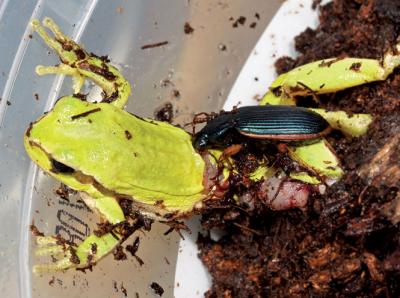Tables Turn as Beetles Kill Toads & Frogs

A type of ground beetle has a strange snacking habit. New research finds the Epomis beetle opportunistically kills and eats amphibians many times its size — animals that usually prey upon the insect.
The beetle's normal diet consists of other invertebrates, such as insects, worms and dead vertebrates, but every time they were put in an enclosure with an amphibian, they attacked and consumed it, the researchers said.
"Amphibians are typical insect predators, and their diet may include adult beetles, ground beetles in particular," study researcher Gil Wizen, at Tel Aviv University in Israel, said in a statement. "The recently filmed successful attacks of the beetles on toads and frogs brought new insights on the amphibian-insect interactions, and documented the uncommon phenomenon of invertebrates preying on vertebrate animals."
In a sick twist of fate, the beetles often like to get to know their meals before dinnertime; in the wild, the researchers frequently found the two sharing shelter during the day, before things turn deadly at night. The beetles aren't picky eaters, either. They prey on amphibians of all types, from frogs and toads to newts and salamanders.
The beetle kills the amphibian by biting it on the back, to which the frog or toad reacts violently, trying to swing the beetle off. The beetle makes an incision in the amphibian's back, which paralyzes it within a few minutes, then slowly devours it from the legs up, usually taking several hours to complete the meal. [Video – Watch the beetle in action]
The study was published in the journal ZooKeys.
You can follow LiveScience staff writer Jennifer Welsh on Twitter @microbelover. Follow LiveScience for the latest in science news and discoveries on Twitter @livescienceand on Facebook.
Get the world’s most fascinating discoveries delivered straight to your inbox.
Jennifer Welsh is a Connecticut-based science writer and editor and a regular contributor to Live Science. She also has several years of bench work in cancer research and anti-viral drug discovery under her belt. She has previously written for Science News, VerywellHealth, The Scientist, Discover Magazine, WIRED Science, and Business Insider.



